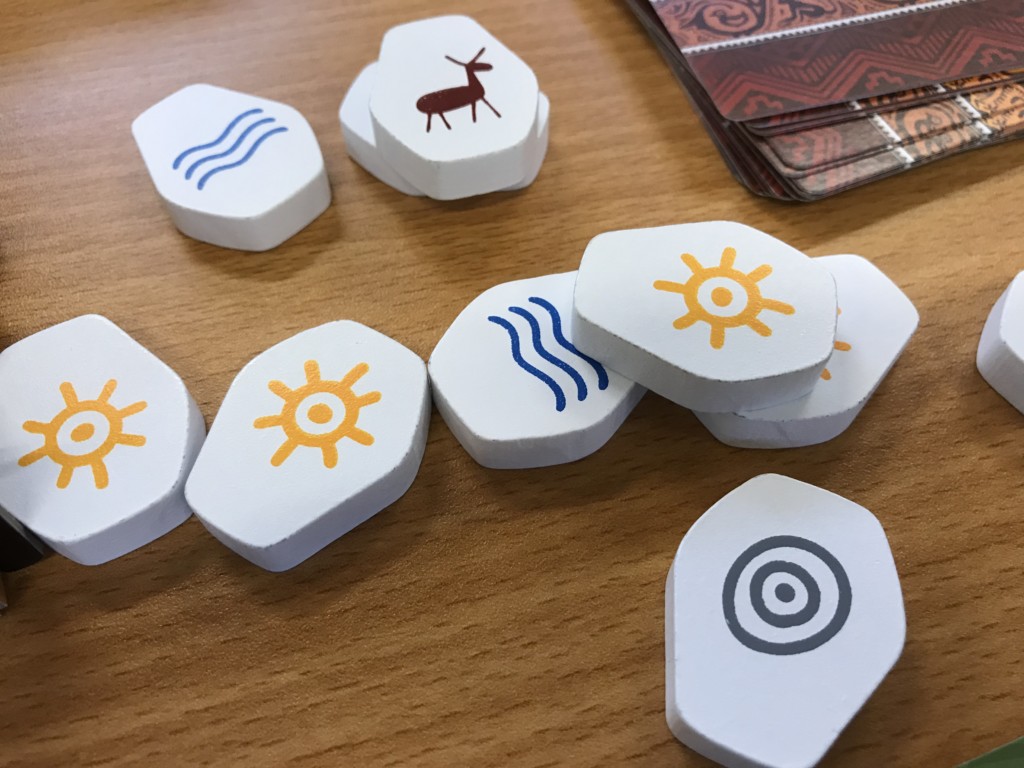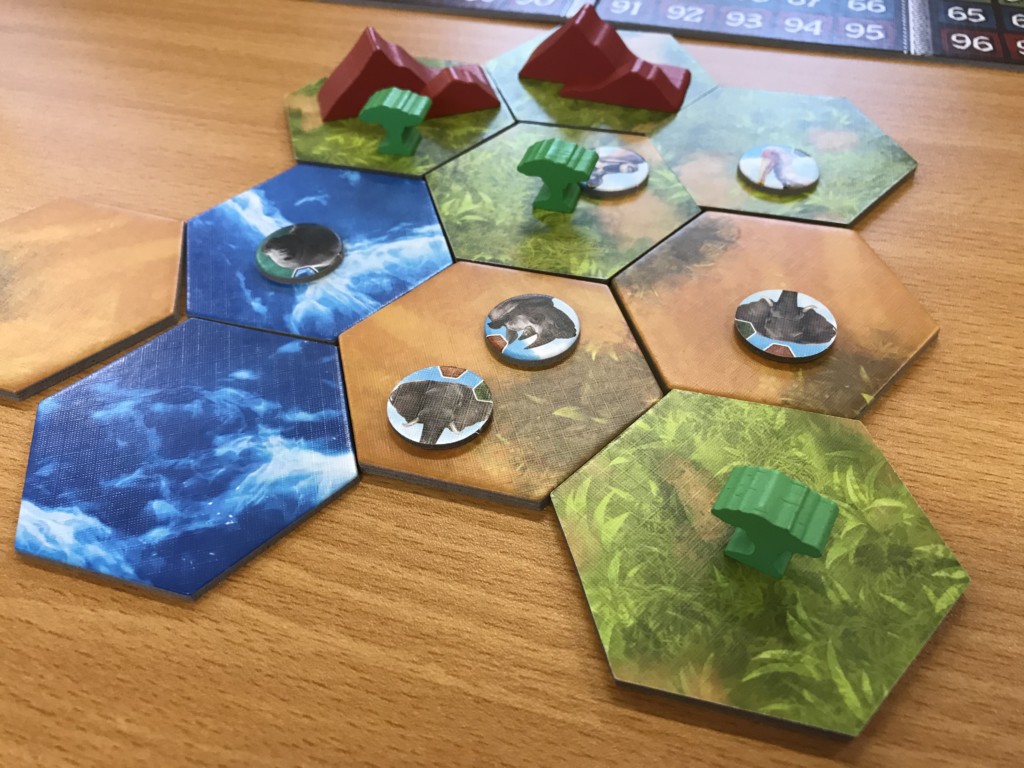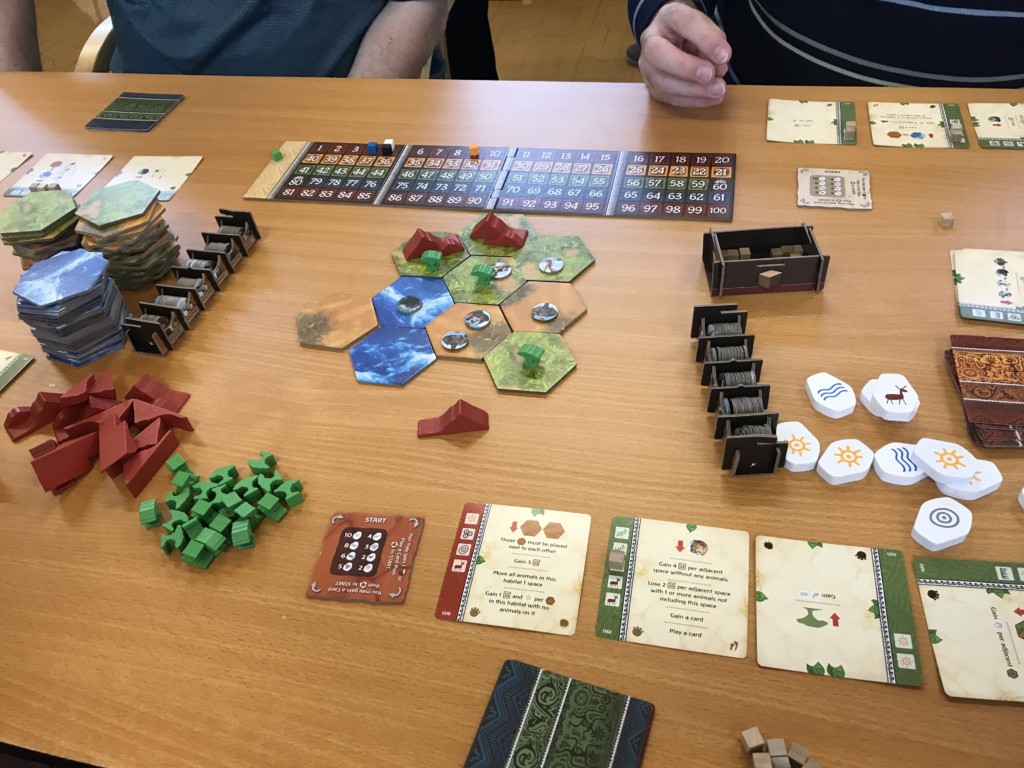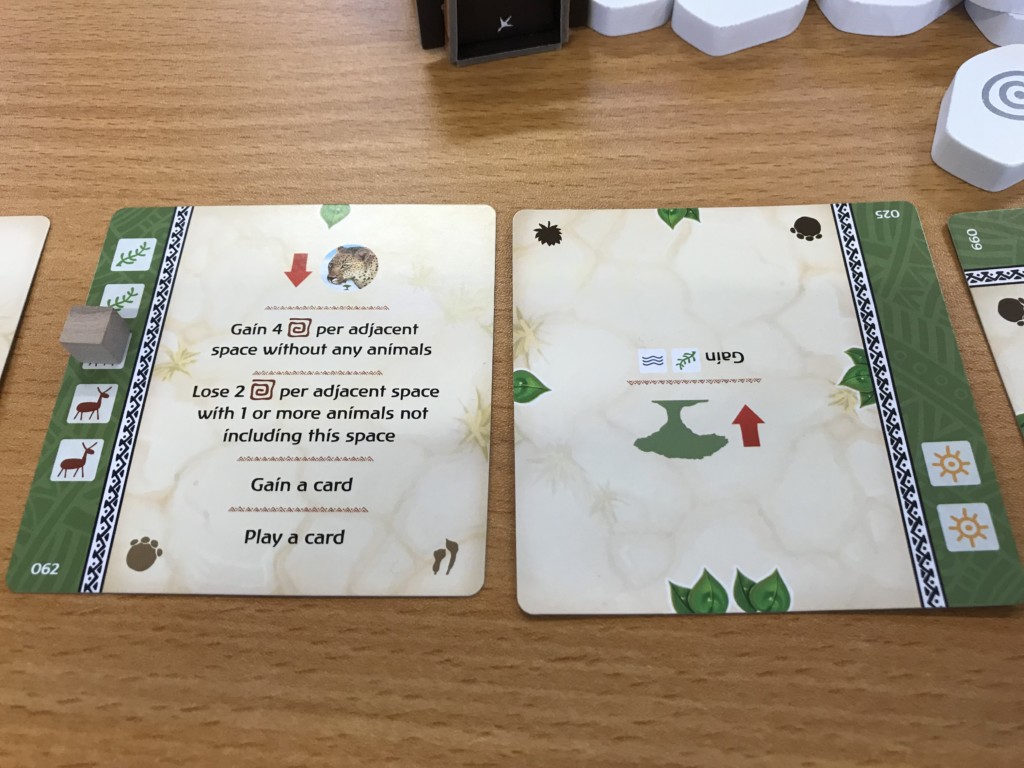Ecos: First Continent First Impressions
Ecos: First Continent sees you build an alternate version of Earth.
But, can you build it how YOU want it to be?
In Ecos: First Continent, players are forces of nature moulding the planet, but with competing visions of its grandeur. You have the chance to create a part of the world, similar but different from the one we know. Which landscapes, habitats, and species thrive will be up to you.
Ecos: First Continent Game Play
OK, here is a brief but not comprehensive overview of what you do and what’s going on.
The planet starts with a few tiles to get things going and everything else is placed to one side. That’s the main game setup really.
Players get a hand of cards which can be either taken from predefined sets or drafted, it’s up to you. Either way, you put 3 of those cards face up in your play area and the other 9 make up your hand.
Choose a random start player, they are the “Harbinger“, give them the bag full of element tokens. They draw one element at a time, call it out and place it on the table.
All players place one of their spare cubes on an uncovered matching element space on one of their face-up cards, like Bingo.
If the wild tile is drawn, players can place it on ANY element, and resolve it as normal but then the elements are returned to the bag and it’s passed to the player on their left.

If you can’t place a cube or don’t want to, you rotate a dial token 90 degrees clockwise. After 2 Turns of the dial, you may draw a new card into your hand and reset the dial or just keep it as it is.
After 3 turns of the dial, you can either Play a Card from your hand or gain an additional Cube from the supply then reset the dial.
Resolving a Card
So eventually as you’re placing cubes you’ll fill every space on a card. If a player does that they shout “Eco!”. Then cards are resolved in clockwise order, starting with the Harbinger.
The Cubes are removed from the card then the actions on the card are resolved from top to bottom. These effects let you:
- Place land tiles on the map to expand the landscape
- Put Mountains or Forests on a land tile
- Place an Animal token on a land tile
- Move Animals onto adjacent land tiles
- Remove land tiles, animals etc
- Gain a cube from the supply
- Gain a specific number of points
- Put a cube on an element on a different card
The reason you do this is that activated cards not only perform actions but some also let you score points for specific things. Maybe you need a Landmass of connected Dessert tiles or lots of Lions or contiguous tiles with Mountains on, that kind of thing.

You need to sculpt the world to meet the criteria on your cards while the other players are doing the same.
These cards also have a number of leaves around the outside of them. After completing a card you rotate it allowing you to complete it and activate it again once filled but decreasing the number of leaves on its top edge. When you need to rotate it but there is only one leaf on the top edge, you discard it instead.
After a Wild tile is drawn and resolved and a player has 80+ points, that is the final round. The player with the most points is the winner.
Theme
Building a planet and populating it is a good theme. Having to manage Mountains, Forests and Animals of different types to gain points is pretty cool.
Maybe you need Gazelles on the board and the Lions come in and eat them all? Maybe you’re collecting Lions but someone turns the tiles they’re on into Water and they drown?
It’s brutal, but so is nature, right?
Setup & Rulebook
Setting up the board is simple, setting up the cards is a pain.
If you’re playing with the pre-con decks you need to sort them out which is a bit of a pain but encourages you to put them away nice and neat. 🙂
The rulebook is pretty good. You need to flip around a bit but it does the job well with examples for everything.
Components & Artwork
The components are fine. The token holders for the animals are great and really help set up. The element tiles are really nice, they didn’t need to look the way they do.
The artwork and design have that real ‘African Safari’ feel… Know what I mean?

Ease of Teaching & Accessibility
Teaching is quite easy as there aren’t that many rules really, not in general. There are a few specific rules I didn’t mention in the summary that people need to know. How many Mountains, Trees and Animals on a tile, what happens when an Animal moves or you can’t place something etc
Nothing too tricky, just a lot to remember.
Everything is open information except cards in hand so teaching could be fine depending on the player.
Ecos: First Continent Summary
So this game is essentially Rise of Augustus with extra steps. The Bingo part of the game is exactly the same and only the main game differs. Even though Ecos: First Continent is more complicated, I actually find it easier to play due to the weird set collection thing Augustus has got going on.
I do like the Bingo mechanism and I did want to see it in a better game than Augustus and it is, so cool.

So, the ‘Main game’ is very nice. People are fighting to shape a single area into their own point-scoring vision. This ‘give and take’ is fun and as players’ cards are face-up, you can look and see what people are trying to do and spoil it 🙂
If someone scores big on a card you’ll want to see if you can disrupt that before they can trigger it again. But do you do it to the detriment of scoring yourself? What’s everyone else doing while you’re doing this?
I already liked the main mechanism so putting a fun, tight and mean game on top of it is great.
Jesta ThaRogue

